Below are a selection of books, articles, podcasts and other resources to deepen our understanding of the many ways in which diversity, equity, inclusion, and accessibility inform, enrich and shape our lives and our work in higher education.
Books on Diversity, Equity, Inclusion and Accessibility in Higher Education
These books are available via ebook or print at the Albin O. Kuhn Library. The print copies can be checked out for two weeks maximum, and are available in a collection entitled “DEIA in Higher Education” which has been set aside for our use. Please enquire at the AOK front desk if you wish to borrow a copy of any of these books.
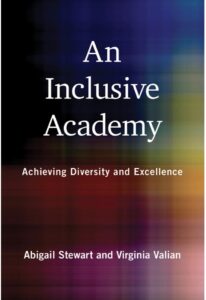
An Inclusive Academy: Achieving Diversity and Excellence
Abigail J. Stewart and Virginia Valian
Most colleges and universities embrace the ideals of diversity and inclusion, but many fall short, especially in the hiring, retention, and advancement of faculty who would more fully represent our diverse world—in particular, women and people of color. In this book, Abigail Stewart and Virginia Valian argue that diversity and excellence go hand in hand and provide guidance for achieving both.
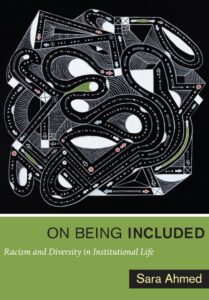
On Being Included: Racism and Diversity in Institutional Life
Sara Ahmed
Diversity is an ordinary, even unremarkable, feature of institutional life. Yet diversity practitioners often experience institutions as resistant to their work, as captured through their use of the metaphor of the “brick wall.” On Being Included explores the gap between symbolic commitments to diversity and the experience of those who embody diversity.
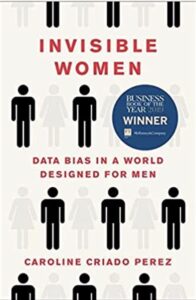
Invisible Women: Data Bias in a World Designed for Men
Caroline Criado Perez
Data is fundamental to the modern world. From economic development, to healthcare, to education and public policy, we rely on numbers to allocate resources and make crucial decisions. But because so much data fails to take into account gender, because it treats men as the default and women as atypical, bias and discrimination are baked into our systems. And women pay tremendous costs for this bias, in time, money, and often with their lives.
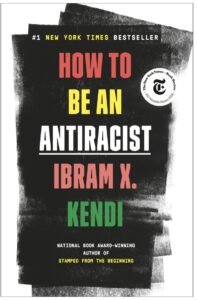
How to Be an Antiracist
Ibram X. Kendi
Antiracism is a transformative concept that reorients and reenergizes the conversation about racism—and, even more fundamentally, points us toward liberating new ways of thinking about ourselves and each other. In How to Be an Antiracist, Kendi takes readers through a widening circle of antiracist ideas—from the most basic concepts to visionary possibilities—that will help readers see all forms of racism clearly, understand their poisonous consequences, and work to oppose them in our systems and in ourselves.
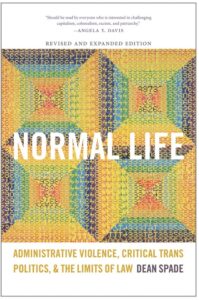
Normal Life: Administrative Violence, Critical Trans Politics, & the Limits of the Law
Dean Spade
In Normal Life Dean Spade presents revelatory critiques of the legal equality framework for social change, and points to examples of transformative grassroots trans activism that is raising demands that go beyond traditional civil rights reforms. Spade explodes assumptions about what legal rights can do for marginalized populations, and describes transformative resistance processes and formations that address the root causes of harm and violence.
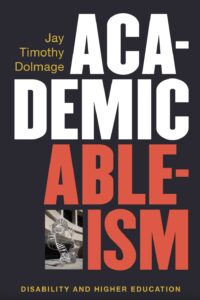
Academic Ableism: Disability and Higher Education
Jay Timothy Dolmage
Academic Ableism brings together disability studies and institutional critique to recognize the ways that disability is composed in and by higher education, and rewrites the spaces, times, and economies of disability in higher education to place disability front and center. Examining everything from campus accommodation processes, to architecture, to popular films about college life, Dolmage argues that disability is central to higher education, and that building more inclusive schools allows better education for all.
Articles on Race and Racism in Higher Education
Brazas, Clarice and Charlie McGeehan, “What White Colleagues Need to Understand.” Learning for Justice. Issue 64, Spring 2020
Diep, Francie, “‘I Was Fed Up’: How #BlackInTheIvory Got Started, and What Its Founders Want to See Next.” The Chronicle of Higher Education. June 9, 2020
Articles on Inclusive Language
Ng, Nicole, “How Inclusive Language at Work Affects Mental Health,” Ragan. March 1, 2022.
Articles on Inclusive Pedagogy
Sathay, Viji and Kelly A. Hogan, How to Make Your Teaching More Inclusive. The Chronicle of Higher Education.
Articles on DEIA Research
Bowleg, Lisa, “The Master’s Tools Will Never Dismantle the Master’s House”: Ten Critical Lessons for Black and Other Health Equity Researchers of Color Health, Education & Behavior. 48:3: pp. 237-249. First published June 3, 2021.
Podcasts
From the Los Angeles Times, “Asian Enough” is a podcast about being Asian American — the joys, the complications and everything in between. In each episode, hosts Jen Yamato, Johana Bhuiyan, Tracy Brown and Suhauna Hussain of the Times invite special guests to share personal stories and unpack identity on their own terms. They explore the vast diaspora across cultures, backgrounds and generations, and try to expand the ways in which being Asian American is defined.
Code switching involves adjusting one’s behavior or expression in order to make others feel more comfortable, and that’s where NPR’s diversity podcast draws its name. Since 2013, journalists Gene Demby and Shereen Marisol Meraji have explored race, culture, and identity with insight and intellectual vigor. And while Meraji is now an occasional contributor, rather than a host, Code Switch remains as compelling and thought-provoking as ever.
Competitive employment and empowerment for people with disabilities is the emphasis of this show. Broadcast live and captioned in real-time for individuals who are deaf and hard of hearing, we discuss how people with disabilities can secure career opportunities, and how employers, organizations and individuals can support employment and empowerment of people with disabilities.
In The Margins: Diverse Education
Achieving equality in higher education. The stakes have never been higher. The issues never more complex. Who graduates, and why? Who is getting hired as faculty and what is their experience? Each episode explores issues surrounding students, faculty, diversity and inclusion.
Latinos Who Lunch is a podcast hosted by artist FavyFav and art historian Babelito. Join them as they discuss everything from pop culture and art to issues of race, gender and class in Latinx communities. While the duo isn’t producing new shows, exploring the 200-episode archive is a great way to learn more about intersectionality.
Host Porter Braswell wants to create a safe space to talk about how race can affect work experiences and outcomes. On the podcast, produced by the Harvard Business Review, leaders share their personal career journeys and talk about how race, equity and inclusion has influenced their paths.
Hosted by New York Times journalists Jenna Wortham and Wesley Morris, this podcast is both entertaining and educational, and the two discuss topics around race, DEI in the workplace, and key cultural conversations.
Blogs
Center for the Study of Racism, Social Justice & Health
The blog of the Center for the Study of Racism, Social Justice & Health, with a focus on promoting health equity through rigorous research, innovative teaching, and community engagement.
Sara Ahmed, Feminist Killjoys
Feminist scholar Sara Ahmed’s reflections on “how bodies and world take shape; and how power is secured and challenged in everyday life worlds as well as institutional cultures.”
Think College: Institute for Community Inclusion, UMass Boston
Think College provides resources, technical assistance and training related to college options for students with intellectual disability. Their blog provides reflections from their team members on Think College projects and current events in the field of inclusive higher education.